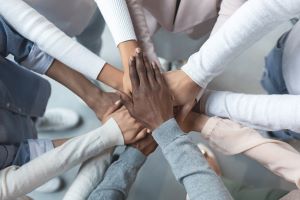
Microaggressions have been described as “a million tiny paper cuts,” and students, staff, and faculty often have to navigate this experience. A microaggression is a statement or behavior that subtly and often unintentionally discriminates against a member of a marginalized group.
“Such messages are coming from a place of biases and stereotypes because you are [perpetuating] what a group should do,” said Jackie Carter, diversity, equity and inclusion manager at the Olin Business School at Washington University in St. Louis. “Biases and stereotypes are being played out in these microaggressions.”
Examples might include: “You speak so well,” or “How did you get in?” Such comments and questions imply that a person did something different from what anyone else would do,” Carter explained.
“Sometimes the behavior or words are unintentional and meant to be an expression of a compliment,” she said. “But I am well aware that it can also be very intentional. It can very much be a reminder of ‘your place.’ Whether intentional or not, it always has a negative effect on how you present in the world.”
Identifying and responding to microaggressions is important to creating an inclusive higher education environment. Carter, along with co-presenters Tricia Ryan of San Jose State University and Soraira Urquiza of the American Film Institute, will be presenting a session on this topic at the 2021 (106th) Annual Meeting. It is one of several sessions that will focus on self-care and supporting community.
“The reason why we want to talk about this topic is to let people know the effect microaggressions have on people of color, and women, too,” Carter said. Gender identity and expression is also impacted by this experience. “I see it as a form of exclusion,” Carter said. “It’s those daily interactions that can build up on members of our community and affect how they are experiencing their environment. It can have an effect on their ability, their activity, their creativity.”
Carter noted that the topic aligns with the larger conversation about access and equity. Constant negative interactions cause doubt about capability, she noted. “We want to give people the opportunity to be authentic, to show up knowing that what they bring is legitimate, is official, and that they got to where they are because they were vetted.”
In fact, while seeming harmless, microaggressions are identified as a form of racism. For person to assume (often negative) stereotypes about another based off of their religion, gender, or ethnicity is insidious. Often ingrained in society, it can be difficult working past racist assumptions, though it is possible. AACRAO is hosting a book club discussion on February 23 on How to be an Antiracist, by Dr. Ibram X Kendi. Register today to be a part of the conversation.
Registration for the virtual meeting opens early February. Join the the email list for updates on registration, session details, speakers, and more.